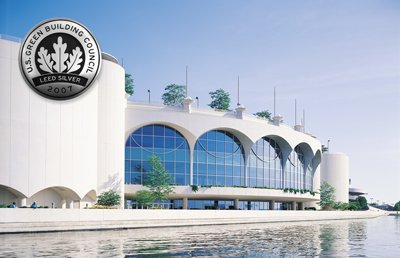Many organizations require that their events meet certain environmental standards. And even if organizations don’t set standards, planners often do. “Ten years ago, planners were not concerned with or even considered greening their meetings—now it’s a more frequent occurrence with folks wanting to meet in a ‘green facility,’” explains Laura MacIsaac, director of sales for Monona Terrace.
Still, some venues are more equipped than others to host a sustainable event. What should you look for when choosing a greener location? Start by asking these five questions.
- Is there an environmental policy in place?
Venues that are serious about their commitment to the environment will put it in writing, often setting strict purchasing rules and green goals. Ask to see a copy of a venue’s policy or plans. (Learn more about Monona Terrace’s sustainability practices here.)
- Are there public transportation options near the site?
Or is it within walking distance to attractions and accommodations? Does the venue provide plenty of bike racks?
- Is there a robust, easy-to-use and measurable recycling program in place? “We conducted an audit to analyze how and what we were throwing away and we learned where we could improve our efforts,” says MacIsaac. “Now, we recycle 49% of the solid waste material that we generate,” she says. Any venue with a sustainability plan should be able to provide this type of statistic.
- Is free Wi-Fi available?
A reliable connection means easier electronic-based communication and less reliance on paper. Also, find out if there are technology-related guidelines that ensure that equipment is turned off after use.
- Does the venue follow responsible catering practices?
These include providing organic and/or local food options, buying condiments in bulk, donating unused food to pantries and composting.“We serve 510,000 people each year, so it’s critical that we infuse environmental practices into our catering operations,” states MacIsaac.One of those practices means partnering with We Conserve, which organizes the collection of food waste and composts it on the University of Wisconsin-Madison campus. Each month, 3,700 pounds of Monona Terrace’s pre-consumer food waste is composted. And while that number is indeed impressive, any responsible caterer should be able to offer stories like that one.
As you plan your event, remember that you don’t need to implement every single environmental practice imaginable. But putting in place even a few can make a huge difference in conserving and restoring resources. Says MacIsaac, “Everyone starts somewhere. Collectively, the results do matter.”
Download a sustainability tip sheet here.
Want to discuss hosting a green event at Monona Terrace?
Contact Laura MacIsaac, CMP, director of sales
lmacisaac@mononaterrace.com or 608.261.4016.

